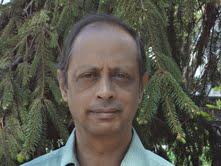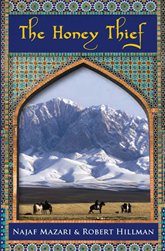 Michelle Murray explores identity and the space where her Scottish/Australian heritage merges with the land and culture of the Simpson Desert Channel Country . After acting college Michelle packed a swag and a bag to live on the edge of the desert with her husband who is descended from the Arabana people. They lived together on Wangkamadla (Bedourie) and Wangkangurru/Yarluyandi (Birdsville) country before moving to rural South Australia where Michelle has an Alexandrina Council artist residency at Goolwa. Michelle is an independent writer/performer. ‘Skeleton Woman’ was originally produced for Onkaparinga Council’s Double Vision art exhibition in October 2011.
Michelle Murray explores identity and the space where her Scottish/Australian heritage merges with the land and culture of the Simpson Desert Channel Country . After acting college Michelle packed a swag and a bag to live on the edge of the desert with her husband who is descended from the Arabana people. They lived together on Wangkamadla (Bedourie) and Wangkangurru/Yarluyandi (Birdsville) country before moving to rural South Australia where Michelle has an Alexandrina Council artist residency at Goolwa. Michelle is an independent writer/performer. ‘Skeleton Woman’ was originally produced for Onkaparinga Council’s Double Vision art exhibition in October 2011.
The Skeleton Woman
Here my body lies, shallow beneath this silken sheet; a skeleton, a wreck, a place for sharks and waves. This thin veil shows my bones, exposes me for my loss of souls. How I yearn to stay submerged. Who could want for a dearth of flesh? Please me. Lay down with me. Sink your spirit into my cavities. Oh, what pleasures we had. This sunken whore who gave of herself so freely now breaks up and splinters; no thought of my own majesty. I dreamed of waves crashing men against rocks and sucking them out to sea. I heard the screams, chased them down the hill; joined the others in their horrible vigil. She took so very long to drown them, to dash them into final silence; those poor men, consignments: bags of wheat and salted meat; help arriving for too few, dragged to comfortable deaths in beds. I waited and waited for your body to emerge to carry you home.
All souls conjure the dead, make me whole again.
***
Remember the day you came?
‘Gidday,’ you said. ‘There’s somewhere here you want a windmill to stand?’ I took you to the top, you looked about, saw foothills falling into a river cliff, the far off swamp, the distant sea, the village below our feet forgotten in the rush toward prosperity. ‘I had no idea this place existed,’ you said.
I’d lay beside the trough breathing the smell of horse sweat, feeling the dirt curved beneath my feet, looking up into the sky with you drilling and me diving into that cosmic ocean, your voice in the windmill’s rusty turning. You would sing out that you could see the church steeple, you could see the ocean liners, you could see that sleepy river snaking her way past the Noarlungas.
‘Enough water for one fine lady thank you Lord, and a bit more for a cup of tea!’
And that was about all we got but not for the want of pumping. But the water didn’t matter, not to me. It was the drilling, the building and sweetest of all, you returning. Adjust a little here, realign there, cups of tea, horse hair, you and me, the river snaking through the valley, the church steeple, the ships waiting, conversation, your gentle mouth, my mother hosting dementia in the house, the clatter and bang of the windmill sucking air and dust and lust.
But it has been so long since I heard your voice, saw your face. Work took you so far away.
‘To be the pelican,’ you would say. ‘Inland lakes, that’d be the way! Erecting windmills, drilling bores, then all the way back to catch fish in the ocean, and you.’
No talk of the wife and kids. Sacred, you’d say. That promise to a dead man to never abandon them. And now you’re gone. That’s what they say. You will never return. I will never see your face. In the shallows of the cove the wreck of The Star of Greece still moans, the ground is hard under my bum, the windmill stands as it has done all this time. Nothing has changed. You are still away. I wait for your return. What else can be done?
***
You are everywhere: cats over fences, reflecting back in mirrors. I slept with a man who might have been you, his shoulders, his flat palette hands. It’s brutal.
***
From a tree in the gully
I hung upside down
The earth the moon
The branch the ground
My brother threw peaches
Dreaming of war
That made him a man
Who never came home
At the tree today in my search for him
I found all the men of my life
Missing
***
At the church on the hill my sins called my name. The minister said that you were found by the governess hanging from a windmill. From a distance it seemed to her eyes that an oblong fruit hung ripening on a tree without roots. Did you cry out? Did you rage that you stepped over that edge? How is it that fate, or misfortune – or worse – left you hanging between sky and earth?
***
I went all the way to the city to see the flowers at the cemetery, to watch the mourners, your family. I saw your wife clutch a man like you; her children stumbled at the grave. I waited a long time to see the backhoe fill you in. Did she hold you? Did she kiss your cold face? I would have stayed but for the train. If I missed it I would have missed the last bus and while I could spend the night on your freshly turned clod I couldn’t be sure of the company you keep. I’ve never known you but the two of us, a horse trough, the hill into the valley and the distant sea. And it’s funny, you know, because I got the feeling when the sun went down that even you didn’t hang around.
***
I found you flying on updrafts seeing way beyond the ships at sea and into the desert channel country. You told me to fly with you inland and make babies. I ran to the updraft, I reached for you tasting you on my tongue – snot and blood and semen. Jesus, where did that come from? When I woke – a rock in my back, the sun hot on my face – I got up and threw stones at those pelicans looking down at me. Such bloody piety.
***
I love your injuries, you would say to me, I crave your cavities, but it’s true isn’t it, that we three are bottles in your collection of miseries. The wife who grieved in your arms, children at her feet, the comfort you gave, the husband you made. The governess you took on the search: every plane, helicopter, car employed. You found him broken inside his chopper – his swag, his bag, her picture – of course you were there for her. And me. What did you see? A wretch trapped in a house of stale bread and boiled meat, a nutcase mother peeing in her bed. I found my legitimacy in you, surely. But of us, why so many?
***
A woman came. We never paid for the windmill.
‘It’ll have to come down,’ she said. ‘I’ll send a man.’ She reached out and touched your welds. ‘Money’s hard to come by these days,’ she said. ‘I wish it wasn’t this way.’ I stroked her cheek. She slapped my face. ‘Where do you get off?’ she spat.
I started to undress. My clothes dropped. Her face froze. My ugly bits exposed. I stared out to sea. I thought of all those sailors dashed on the rocks and their families.
‘We made love right here,’ I said, ‘again and again,’ since she thought she knew everything. She stared at the spot until something snapped. She raged back to her car but came back. She’d dropped her keys.
‘Put your bloody clothes back on,’ she said. She went through everything back and forth from the car; turned her bag inside out. The day started to deteriorate. She was crying I could see. ‘Oh, the humility,’ she kept saying and then she said, ‘oh the pain’. She threw stones at the windmill. ‘Why?’ she kept asking. I don’t know if it was why you slept with me or why you died. She cried and cried. I went to the house to check my mother. When I got back your wife was crumpled by the trough scratching the dry inside with a rock. I climbed in and she followed. She said you were a good lover, a good provider. She said you could never replace her first husband. She told you that. ‘I told him that,’ she said looking now at me. ‘What was I thinking?’ We sat quiet for a long time. ‘There’s another one,’ she said, ‘the one who found him. I want to hate her but it won’t come. All I can think is that poor woman. Then I wish it was me, not her. Then I’m glad it’s not my burden to bear. You’re the lucky one,’ she said. We drank from her bottle of gin.
‘What about your kids.’ I asked.
‘Oh, they’ll be fine,’ she said.
I was sure I could hear mum. She was drinking fast, your wife.
‘I really have to go, my mother,’ I said.
‘Oh,’ she said. We stood in the trough with no water.
At the house she watched me wipe my mother’s arse, make porridge and the old woman flick it all about. I made tea but she was happy with her gin. When she nearly fell over I steered her to my bedroom. She fell on the bed and complained the room was spinning. I left a bucket, wrestled the blankets; she snored and vomited. In the morning she sat with coffee at the end of my bed. I woke with her looking at me like an eagle surveying the dead.
‘I could like you,’ she said. Sober I suppose or at least with a hangover she leaned over and kissed me long on the lips. ‘I thought I was carrying this all myself but it’s not true is it?’ When she got up to leave she turned back. ‘I’ll still have to take the windmill. Sorry about that.’
***
We decided you were either an angel or an arsehole, a lover or a fraud. You dropped blessings into our cups then dropped off the face of the earth. We laughed hysterically into our glasses then cried at separate times. When one cried the other thought she a thief stealing memories. We hated each other passionately. She told me I don’t have a single interesting thought in my head so I must be good in bed.
‘You live in a disgusting mess,’ she said
‘I am a disgusting mess,’ I told her. ‘You should appreciate my transparency.’ She agreed, poured another one and we started all over again exchanging insults, doing our best to bruise each other, promising that we would not let the other go numb, promising that we’d still feel the pain then one day she didn’t come. A week went by. I got to thinking about you again, the windmill gone – nothing to focus on. I went to the ocean, took lavender and frankincense, poured the essence into the water, thought of sailors and lovers, sharks and blood, and her, thought of shipwrecks submerged and then I knew an entire world lived inside of you. A story I don’t know. Even so, like so many men, you took it to the grave: the unspeakable, the unfathomable, buried shallow, unreachable.
***
I got a letter from the governess the other day:
Just to say he spoke about you. I’m sorry I have nothing to say except the last thing he said to me was we will all understand one day. I lived like a skeleton woman, no flesh on my bones. I was certain no man would touch me but one did eventually come along. I hope you’re not alone. I read in the paper about water near your home. How a town was drowned, that the people can still be found sitting at the table ready to eat their meal; roads, bus stops, playgrounds but I doubt it’s real. When I think of it I think of you. I dreamed that you were washed out to sea, the dam wall broken dragging you out into water so deep I thought for sure you would never be retrieved, but on a beach my daughter picked up a pelican feather and I knew that one day you would find me and we would be sisters.
***
It’s been a long time now, my mother finally dead but not until she was utterly dependent. At the end she spoke of the beginning, she spoke of her childhood as she spoke of giving birth. She spoke to my brother, reaching out her hand and when the time came she spoke of pain. Then I really was alone. I put the place on the market. A run-down house built with no particular thought on land devoid of permanent water is worth a lot it turns out. I’m going to travel to all the places you spoke of and when I’m done I will travel beyond any place I have ever imagined. I hope one day that the wailing creaking cries of the sailors and the sunken woman bereft beneath the waves diminishes, that I will be fleshed out, that new life will spring from me and all of this will become a memory.
Goodnight my lovely.









